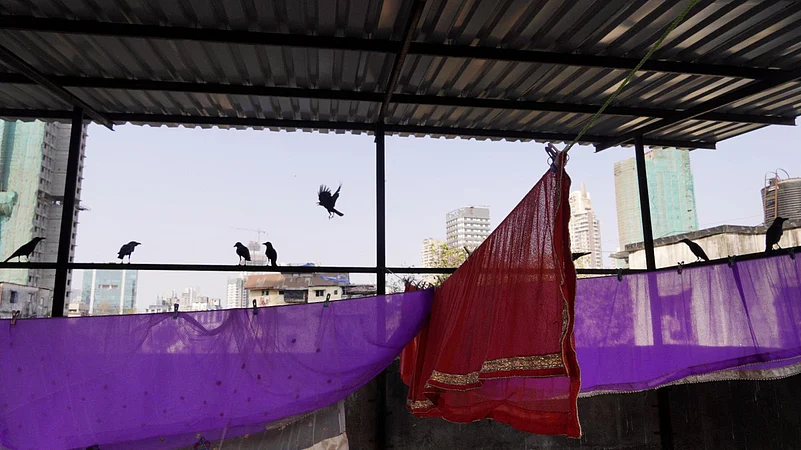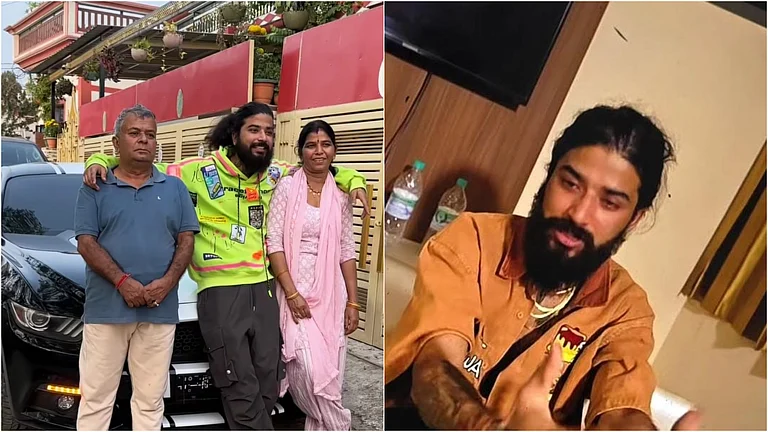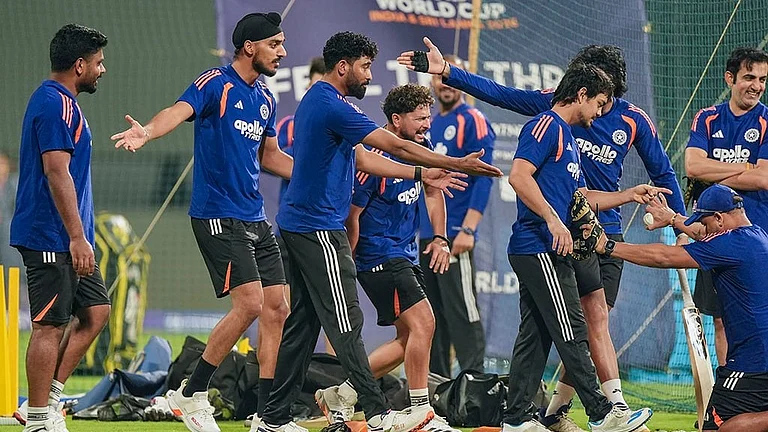Saadat Hasan Manto’s short story ‘Das Rupay’ is the story of a 15-year-old who was pushed into the flesh trade by her mother. Manto had arrived in Bombay from Amritsar in 1936 at the age of 24. Before he moved to Adelphi Chambers after marriage, he lived in a chawl believed to be in Arab Gully near Kamathipura. During the five years he lived in the chawl, editing a film magazine called ‘Mussawir’, he visited Kamathipura, often for the material for his stories.
Excerpts:
She was at the corner of the alley playing with the girls, and her mother was looking for her in the chawl (a big building with many floors and many small rooms). Sarita’s mother had asked Kishori to sit down, had ordered some coffee-mixed tea from the tea boy outside, and had already searched for her daughter throughout the chawl’s three floors. But no one knew where Sarita had run off to. She had even gone over to the open toilet and had called for her, ‘Hey, Sarita! Sarita!’ But she was nowhere in the building, and it was just as her mother suspected — Sarita had gotten over her bout of dysentery (even though she hadn’t taken her medicine), and without a care, in the world, she was now playing with the girls at the corner of the alley near the trash heap.
Sarita’s mother was very worried. Kishori was sitting inside, and he had announced that three rich men were waiting in their car in the nearby market. But Sarita had disappeared. Sarita’s mother knew that rich men with cars don’t come around every day, and in fact, it was only thanks to Kishori that she got a good customer once or twice a month because otherwise rich men would never come to that dirty neighbourhood where the stench of rotting paan and burnt-out bidis made Kishori pucker his nose.
Really, how could rich men stand in such a neighbourhood? But Kishori was clever, and so he never brought men up to the chawl but would make Sarita dress up before taking her out. He told the men, ‘Sirs, things are very dicey these days. The police are always on the lookout to nab someone. They’ve already caught 200 girls. Even I am being tried in court. We all have to be very cautious.’
Sarita’s mother was very angry. When she got to the bottom of the stairs, Ram Dai was sitting there cutting bidi leaves. ‘Have you seen Sarita anywhere?’
Sarita’s mother asked her. ‘I don’t know where she’s gone off to. If I find her, I’m going to beat her to a pulp. She’s not a little girl anymore, and yet she runs around all day with those good-for-nothing boys.’
Ram Dai continued cutting bidi leaves and didn’t answer because Sarita’s mother usually went around muttering like this. Every third or fourth day she had to go looking for Sarita and would repeat these very words to Ram Dai where she sat all day near the stairs with a basket in front of her as she tied red and white strings around the cigarettes. In addition to this refrain, the women of the building were always hearing from Sarita’s mother how she was going to marry Sarita off to a respectable man so that she might learn how to read and write a little, or how the city government had opened a school nearby where she was going to send Sarita because her father very much wanted her to know how to read and write. Then she would sigh deeply and launch into a recitation of her deceased husband’s story, which all the building’s women knew by heart. If you asked Ram Dai how Sarita’s father (who had worked for the railway) reacted when his boss swore at him, then Ram Dai would immediately tell you that he got enraged and told off his boss, ‘I’m not your servant but a servant of the government. You don’t intimidate me. Look here, if you insult me again, I’m going to break your jaw.’ Then it happened. His boss went ahead and insulted Sarita’s father, and so Sarita’s father punched him in the neck so hard that this man’s hat fell to the floor and he almost collapsed. But he didn’t. His boss was a big man — he stepped forward and with his army boot kicked Sarita’s father in the stomach with such force that his spleen burst and he fell down right there near the railroad tracks and died. The government tried the man and ordered him to pay 500 rupees to Sarita’s mother, but fate was unkind: Sarita’s mother developed a love for gambling and in less than five months wasted all the money Sarita’s mother was always telling this story, but no one knew whether it was true. No one in the building felt any sympathy for her, perhaps because their lives were so difficult that they had no time to think about others. No one had any friends. Most of the men slept during the day and worked nights in the nearby factory. Everyone lived right on top of one another, and yet no one took any interest in anyone else.
Almost everyone in the building knew that Sarita’s mother was forcing her young daughter to be a prostitute, but because they weren’t in the habit of concerning themselves with others, no one ever contradicted Sarita’s mother when she would lie about how innocent her daughter was. Once when Tukaram harassed Sarita by the water spigot one early morning, Sarita’s mother started screeching at Tukaram’s wife, ‘Why can’t you keep track of that dirty rat? I pray to God he goes blind for eyeing my little girl like that. I’m telling you the truth, someday I’m going to smack him so hard he won’t know up from down. If he wants to raise hell somewhere else, that’s fine, but if he wants to live here, he’s going to have to behave like a respectable person, got it?’
Hearing this, Tukaram’s squint-eyed wife rushed out of her room tying on her sari. ‘Watch out, you old witch, if you say anything else!’ she said. ‘Your little angel flirts with even hotel boys. You think we’re all blind — you don’t think we know about that fine character who comes to your place and why your little Sarita gets dressed up and goes out? You — going on about honour — you must be kidding! Go! Get out of here!’
Tukaram’s wife was notorious for many things, but every single person in the building knew about her relationship with the kerosene seller, about how she would call him inside and close the door. Sarita’s mother made it a point to mention this. In a spiteful voice, she harped, ‘And your gigolo, the kerosene seller? You take him into your room for two hours just to sniff his kerosene?’
And yet Sarita’s mother and Tukaram’s wife wouldn’t stay angry for long. One day Sarita’s mother saw Tukaram’s wife whispering sweet nothings to some man in the darkness of night, and the very next day when Tukaram’s wife was coming back from Pydhoni, she saw Sarita seated with a ‘gentleman friend’ in a car, and so the two agreed that they were even and began talking to each other again.
‘You didn’t see Sarita anywhere, did you?’ Sarita’s mother asked Tukaram’s wife. Tukaram’s wife looked through her squinty eyes towards the alley’s corner. ‘She’s playing with her friend over by the trash heap.’ Then she whispered, ‘Just a minute ago Kishori went upstairs, did you see him?’
Sarita’s mother glanced right and left. Then she whispered, ‘I just asked him to sit down, but Sarita’s always disappearing right when she’s needed. She doesn’t ever think, she doesn’t understand anything. All she wants to do is play all day.’ Then she headed off towards the trash heap, and when she reached the concrete urinal, she went up to Sarita, who immediately stood up and a despondent expression spread over her face. Sarita’s mother angrily grabbed her by the arm and said, ‘Go home — get going! All you do is horse around, you good-for-nothing.’ Then as they were on their way home, she whispered, ‘Kishori’s been waiting. He brought a rich man with a car. So listen. Hurry and run upstairs. Put on that blue georgette sari. And look, your hair’s all messed up. Get ready quick, and I’ll fix your hair.’ Sarita was very happy to hear that a rich man with a car had come. She didn’t care about the man but she really liked car rides. When she was in a car speeding through the empty streets, the wind whipping over her face, she felt as though she had been transformed into a rampaging whirlwind. Sarita must not have been any older than fifteen, but she acted like a thirteen-year-old. She hated spending time with women and having to talk to them. All day long she kept busy playing meaningless games with younger girls. For example, she really liked to draw chalk lines on the alley’s black asphalt, and she would play this game with so much concentration that it seemed as though the world would end if those crooked lines weren’t there. Or she would take an old gunnysack from their room and spend hours engrossed with her friends on the footpath — twisting it around, laying it on the pavement, sitting on it, and such childish things.
Sarita wasn’t beautiful or fair-skinned. Her face was always glossy because of Bombay’s humid climate, her thin lips looked like the brown skin of the chikku fruit and were always lightly quavering, and above her upper lip, you could always find three or four glistening beads of sweat. And yet she was healthy. Although she lived in a dirty neighbourhood, her body was graceful and fit — in fact, you could say that she embodied youth itself. She was short and a little chubby, but this chubbiness made her seem only healthier, and when she rushed about the streets, if her dirty dress should fly up, passing men would look at her young calves that gleamed like smooth teak. Her pores were like those of an orange, its skin filled with juice, which, if you applied the slightest pressure, would squirt up into your eyes. She was that fresh.
Sarita had good-looking arms as well. Even though she wore a poorly fitting blouse, the beauty of her shoulders was still visible. Her hair was long and thick and always smelled of coconut oil, and her braid snapped like a whip against her back. Sarita didn’t like the length of her hair because her braid gave her problems when she played, and she had tried all sorts of ways to hold it in place.
Sarita was blissfully free from worry. She got two meals a day, and her mother did all the work at home. Sarita carried out only two duties: every morning she would fill up buckets of water and take them inside, and in the evening she would fill up the lamps with a drop or two of oil. This had been her strict routine for years, and so each evening, without thinking, she would reach for the tea saucer in which they kept their coins and grab one before taking the lamp down to buy oil.

Once in a while, about four or five times a month, Kishori would bring customers, and the men would take Sarita off to a hotel or some dark place, and she considered this good entertainment. She never bothered much about these nights, perhaps because she thought that some guy like Kishori must go to other girls’ houses too. Perhaps she imagined that all girls had to go out with rich guys to Worli to sit on cold benches, or to the wet sand of Juhu Beach. Whatever happened to her must happen to everyone, right? One day when Kishori brought a regular john, Sarita said to her mother, ‘Mom, Shanta’s old enough now. Send her out with me, okay? This one always orders me eggs, and Shanta really likes eggs.’ Her mother replied evasively, ‘Okay, okay, I’ll send her out once her mom comes back from Pune.’ The next day Sarita saw Shanta coming back from the open toilet, and she told her the good news, ‘When your mom comes back from Pune, everything’s going to work out. You’ll start coming with me to Worli.’ Then Sarita told the story of what had happened one recent night, making it sound like a wonderful dream. Shanta was two years younger than Sarita, and after listening to Sarita’s story, she felt a ripple of excitement course through her body. She wanted to hear even more, so she grabbed Sarita’s arm and said, ‘Come on, let’s go outside.’ They went down near the open toilet where Girdhari, the shopkeeper, had put out ten rupees 17dirty pieces of coconut to dry on gunnysacks. There they gossiped for hours.
**
Behind a makeshift curtain, Sarita was putting on her blue georgette sari. The cloth gave her goose bumps, and the thought of the upcoming car ride excited her. She didn’t stop to think about what the man would be like or where they would go, but as she quickly changed she hoped that the car ride wouldn’t be so short that before she knew it, she would be standing in front of the door to some hotel room where once inside, the john would start drinking and she would begin to feel claustrophobic. She hated those suffocating rooms with their two iron beds on which she could never get a good sleep.
Smoothing out her sari’s wrinkles, she let Kishori look at her for a second, then asked him, ‘Kishori, how do I look? Is the sari okay from behind?’ Without waiting for an answer, she went over to the broken wooden chest where she kept her Japanese powder and rouge. She set her rusted mirror up against the window’s iron bars, and bending over a little to look at her reflection there, she put powder and purple-tinged rouge on her dusky cheeks. When she was ready, she smiled and looked at Kishori for his approval. Then she haphazardly covered her lips in lipstick. The sum effect was that she looked like one of those clay dolls that appear in toy sellers’ stores over Diwali.
Sarita’s mother came in, quickly fixed Sarita’s hair, and said to her daughter, ‘Look, my little girl, remember to talk like a grown-up, and do whatever he says. This man is very rich, okay? He even has his own car.’ Then she turned to Kishori, ‘Now, quickly, take her out. The poor man! Just think how long he’s been waiting!’
Outside in the bazaar, there was a factory wall stretching into the distance on which a small sign read, ‘NO URINATING’. Next to this sign, there was a parked yellow car in which three young men from Hyderabad were sitting, each one covering his nose with a hanky. (They would have moved the car, but the wall went on for a long way and the stench of piss ran its entire length.) When the driver saw Kishori, he said to his friends, ‘Hey, he’s coming. Kishori. And . . . and . . . hey, this girl’s really young! Guys, look — the one in the blue sari.’
When Kishori and Sarita came up to the car, the two men in the back seat picked up their hats and cleared space between them for Sarita. Kishori stepped forward, opened the back door and quickly pushed Sarita inside. Then he closed the door and said to the guy behind the wheel, ‘Sorry it took so long. She had gone to see a friend. So . . . so . . .?’ The young man turned around to look at Sarita and then said to Kishori, ‘Okay, then. But, look . . .’ He stuck his head out of the window and whispered to Kishori, ‘She won’t put up a fuss, will she?’
Kishori put his hand on his heart. ‘Sir, please trust me.’ The young man took two rupees out of his pocket and gave it to Kishori. ‘Go enjoy yourselves,’ Kishori said and waved goodbye. Then the driver started the car.
It was five in the evening, and traffic filled the Bombay streets — cars, trams, buses, and people were everywhere. Sarita didn’t say anything as she sat scrunched between the two men. She squeezed her thighs together and rested her hands on her lap, and several times just as she had built up the courage to say something, she would suddenly stop. She wanted to tell the driver, ‘Sir, please drive quickly. I’m about to suffocate back here.’
No one said anything for quite some time; the driver watched the road, and the men in the back seat were silent as they thought anxiously about how for the first time they were sitting so close to a young girl, one who was theirs, one with whom they could mess around without getting into any trouble.
The driver had been living in Bombay for two years and had picked up girls like Sarita both during the day and at night; he had had many prostitutes in his yellow car and so wasn’t nervous in the least. His two friends had come from Hyderabad: Shahab wanted to experience all that the big city had to offer, and so Kifayat, the owner of the car, had bought Sarita through Kishori. Kifayat had said to his second friend, Anwar, ‘You know, there’d be nothing wrong if you got one for yourself.’ But Anwar thought it wrong and couldn’t bring himself to consent. Kifayat had never seen Sarita before, and despite the novelty she presented, he wasn’t interested in her just then, since he couldn’t very well drive and look at her at the same time.
Once they left the city and entered the suburbs, Sarita sprang to life. The cool wind rushing over the speeding car soothed her, and she felt fresh and full of energy again. In fact, she could barely contain herself: she began to tap her feet, sway her arms, and drum her fingers as she glanced back and forth at the trees that streamed past the road. Anwar and Shahab were becoming more relaxed, and Shahab felt he could do whatever he wanted with Sarita. He reached around her waist, and suddenly Sarita felt someone tickling her. She sprang away, wriggling close to Anwar, and her laughter trailed from the car’s windows far into the distance. Again Shahab reached out for Sarita, and she doubled over, laughing so hard that she could hardly breathe, forcing Anwar to scrunch against the car door and try to maintain his composure.
Shahab was in ecstasy, and he said to Kifayat, ‘By God, she’s really spunky!’ Then he pinched her thigh very hard, and Sarita reacted impulsively, twisting Anwar’s ear for no reason other than he was closest. Everyone burst out laughing. Kifayat kept looking over his shoulder even though he could see everything in the rearview mirror. He sped up, trying to keep pace with the laughter in the back seat.
Sarita wanted to get out and sit on the car’s hood next to its iron fixture shaped like a flying bird. She leaned forward, Shahab poked her, and Sarita threw her arms around Kifayat’s neck in order to keep her balance. Without thinking, Kifayat kissed her hand, and Sarita’s entire body tingled. She jumped over the seat to sit next to Kifayat where she began to play with his necktie. ‘What’s your name?’ she asked.
‘Me? I’m Kifayat.’ Then he took out ten rupees from his pocket and gave it to her.
The money distracted Sarita, and she instantly forgot what Kifayat had said as she took the note and crammed it into her bra. She was a child — ignorant and happy. ‘That was very nice of you,’ she said. ‘And your necktie’s nice too.’
Sarita was in such a good mood that she liked everything she saw. She wanted to believe that even bad things could be redeemed, she wanted the car to continue speeding along, and she wanted everything to fall into the whirlwind.
Suddenly she wanted to sing. She stopped playing with Kifayat’s tie and sang, ‘It was you who taught me how to love/and woke my sleeping heart.’
After singing this film song for a while, Sarita suddenly turned around and said to Anwar, ‘Why are you so quiet? Why don’t you say something? Why don’t you sing something?’ Then she jumped into the back seat and began to run her fingers through Shahab’s hair and said to him, ‘Let’s sing together. Do you remember that song Devika Rani sang, “I wish I could be a bird singing through the forests”? I really like Devika Rani.’ Then she put her hands together, propped them beneath her chin, and batting her eyelashes began to tell the story, ‘Ashok Kumar and Devika Rani were standing next to each other, and Devika Rani said, “I wish I could be a bird singing through the forests”, and Ashok Kumar said . . .’ Suddenly Sarita turned to Shahab, ‘Sing along, okay?’
Sarita began to sing, ‘I wish I could be a bird singing through the forests’. And in a coarse voice, Shahab repeated the same.
Then they all began singing together. Kifayat began honking the horn to the song’s rhythm, and Sarita followed the beat by clapping. Sarita’s feminine voice mixed with Shahab’s raspy one, as well as the horn’s honking, the wind’s rushing, and the engine’s rumbling — it all sounded like the music of a small orchestra.
Sarita was happy — Shahab was happy — Kifayat was happy — and seeing them all happy made Anwar happy too, and yet he was embarrassed for having been so inhibited. He felt a tingling sensation in his arms, and his repressed emotions awoke: he stretched loudly, yawned, and then felt ready to join in the revelry.
As she sang, Sarita took Anwar’s hat from his head, put it on and then jumped into the front seat to look at herself in the rearview mirror. Seeing Sarita wearing his hat, Anwar couldn’t remember whether he had been wearing it from the beginning of the car ride. He felt disoriented.
Sarita slapped Kifayat’s thigh and asked, ‘If I put on your pants, and wore your shirt and tie, would I look like a well-dressed businessman?’
But this talk of cross-dressing upset Shahab, and he shook Anwar’s arm, ‘By God, you’re such an idiot to have given her the hat!’ Anwar took these words to heart. He thought for a moment that he really was an idiot.
‘What’s your name?’ Kifayat asked Sarita.
‘My name?’ Sarita took the hat’s elastic cord and strapped it in beneath her chin. ‘Sarita.’
‘Sarita, you’re not a woman but a firecracker,’ Shahab said. Anwar wanted to say something, but Sarita began to sing in a loud voice, ‘I’m going to build my house in the City of Love and forget the rest of the world!’
Kifayat and Shahab felt transported, but Anwar still couldn’t get over his nerves. Sarita kept singing, ‘I’m going to build my house in the City of Love and forget the rest of the world . . .’ and she stretched out the last word for as long as her breath lasted. Her long hair was blowing back and forth, and it looked like a column of thick smoke spreading in the breeze. She was happy.
Sarita was happy — Shahab was happy — Kifayat was happy —and Anwar once again tried to join in, but when the song ended, everyone felt as though a shower of rain had suddenly stopped.
Kifayat asked Sarita to sing another song.
Yeah, one more,’ Shahab encouraged her. ‘If they could only hear us now!’
Sarita began to sing, ‘Ali has come to my courtyard. I’m staggering from joy!’ Hearing these lyrics, Kifayat began swerving the car from side to side. Then suddenly the winding road ended, and they found themselves near the sea. The sun was setting, and the breeze off the ocean was becoming colder by the minute.’
Kifayat stopped the car. Sarita got out and set off running down the beach, and Kifayat and Shahab joined her. She ran upon the wet sand by the tall palm trees that rose along the ocean’s open vista, and she wondered what it was she wanted — she wanted to fade into the horizon, dissolve into the water, and soar so high into the sky that the palm trees stood beneath her; she wanted to absorb the sand’s moisture through her feet, and . . . and . . . the car, the speed, the lash of the rushing air . . . she felt transported.
The three young men from Hyderabad sat down on the wet sand and began to drink beer, but then Sarita grabbed a bottle from Kifayat and said, ‘Wait, let me pour you some.’
Sarita poured so quickly that the beer’s head rose over the glass’s edge, and this pleased her extraordinarily. She dipped her finger into the beer and licked off the foam, but it was very bitter and she immediately puckered her lips. Kifayat and Shahab burst out laughing.
When he couldn’t stop, Kifayat had to look away to calm himself, and then he saw that Anwar too was laughing. They had six bottles — some they poured quickly so that his head overflowed their glasses and its foam disappeared into the sand, and some they actually managed to drink. Sarita kept singing, and once when Anwar looked at her, he imagined that she was made of beer. The damp sea breeze was glistening on her dark cheeks. She was very happy, and now Anwar was too. He wished that the ocean’s water would change into beer, and then he would dive in with Sarita. Sarita picked up two empty bottles and banged them against each other. They clanged loudly, and she burst out laughing, and everyone followed suit.
‘Let’s go for a drive,’ she suggested to Kifayat. They left the bottles right there on the wet sand and raced ahead to the car to their seats. Kifayat started the engine and off they went. Soon the wind was rushing over them and Sarita’s long hair streamed up, over her head. They began to sing. The car sped, lurching down the road, and Sarita kept singing where she sat in the back seat between Anwar, who was dozing, and Shahab. Mischievously, she started to run her fingers through Shahab’s hair, yet the only effect of this was that it lulled him to sleep. Sarita turned back to look at Anwar, and when she saw that he was still sleeping, she jumped into the front seat and whispered to Kifayat, ‘I’ve put your friends to sleep. Now it’s your turn.’
Kifayat smiled. ‘Then who’ll drive?’
‘The car will drive itself,’ Sarita answered, smiling. The two lost track of time as they talked with each other, and before they realized it, they found themselves back in the bazaar where Kishori had ushered Sarita into the car. When they got to the factory wall with the ‘NO URINATING’ sign, Sarita said, ‘Okay, stop here.’
Kifayat stopped the car, and before he could say or do anything Sarita got out, waved goodbye and headed to her home. With his hands still on the wheel, Kifayat was replaying in his mind all that had just happened when Sarita stopped and turned around. She returned to the car, removed the ten-rupee note from her bra and dropped it onto the seat next to him. Startled, he looked at the note. ‘What’s this, Sarita?’
‘This money — why should I take it?’ she said before she turned and took off running. Kifayat stared in disbelief at the note, and when he turned to the back seat, his friends were fast asleep.
(Saadat Hasan Manto was one of the renowned Urdu fiction writers, known for writing some masterpieces like ‘Thanda Gosht’, ‘Khol Do’ and ‘Toba Tek Singh’. Excerpted from Bombay Stories by Saadat Hasan Manto,
translated by Matt Reeck and Aftab Ahmad, with permission from
Penguin Random House India)


















